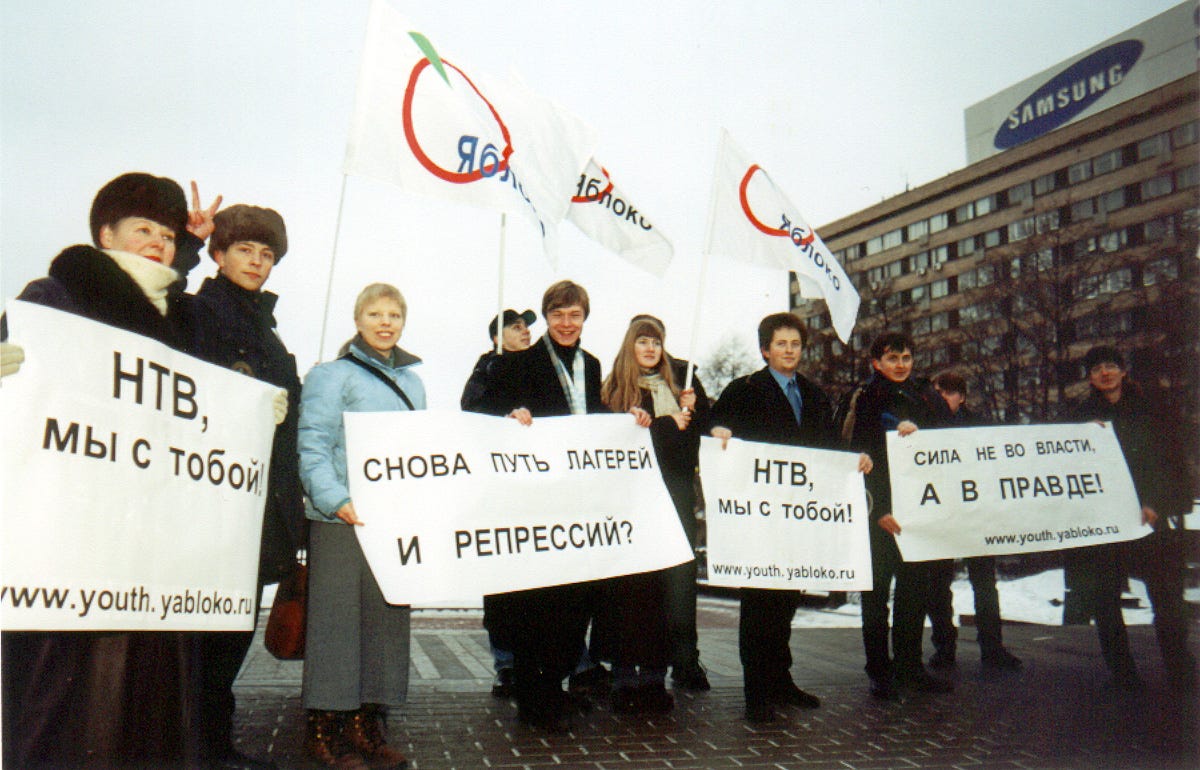ICWA@100: How Russians learned to stop worrying and love President Putin
Gregory Feifer on Putin’s state takeover of the main independent television station in 2001.
Gregory Feifer is an author, journalist and executive director of the Institute of Current World Affairs. During his fellowship in Russia from 2000 to 2002, he reported on political culture, politics and society during President Vladimir Putin’s first term. He lived in Russia for a decade, including as NPR’s Moscow correspondent. His books include Russians: The Power behind the People, The Great Gamble, a history of the Soviet war in Afghanistan, and Spy Handler, cowritten with former KGB colonel Victor Cherkashin. He holds bachelor’s and master’s degrees from Harvard University.
President Vladimir Putin’s state takeover of the independent NTV television station in early 2001 was a major first step in his authoritarian consolidation of power. The channel had earned a reputation as the feisty leading TV news broadcaster under Putin’s predecessor, Boris Yeltsin. In this excerpt, Greg witnesses the final days of a standoff between NTV’s journalists and the Kremlin-approved new management inside Moscow’s sprawling Ostankino television studio compound, a development one of the station’s journalists described as “the point of no return” for Russia.
MOSCOW (January 2001) — The Kremlin finally ended its silence by issuing a statement saying Putin had told [former Soviet leader Mikhail] Gorbachev he would like to see the NTV affair settled in court. That seemed to indicate the standoff would continue indefinitely—something that gave NTV some hope for survival. But to many observers, the Kremlin’s real position had already been made all too clear—and it didn’t favor the channel. Putin’s tactics had by then become predictable.
Last summer, the government carried out a crackdown against some of the country’s top companies, hoping to signal that the era of oligarchs and their political influence was over. Formally, nothing came of the many threatened lawsuits and tax-police raids (with which the Kremlin also had ostensibly nothing to do). When the dust settled, [the financial oligarch owner of NTV Vladimir] Gusinsky [who was a former supporter of Putin’s main political opposition] had fled abroad together with [another leading oligarch and Putin critic, Boris] Berezovsky. The powerful businessmen who remained in Russia did so by publicizing outward support for the president. In turn, their control over industries such as oil and metals was allowed to blossom through a series of mergers and acquisitions. It wasn’t the end of the oligarchy as the Kremlin claimed but the beginning of its slavish support for the top dog.
The same kind of ham-fisted, crisis-provoking approach brought about Moscow’s ongoing second war in Chechnya—at the cost of thousands of innocent lives and misery for hundreds of thousands. And it is also true for the media. The Kremlin may have once again prompted a massive outcry from critics about its methods of control, but that was the price it paid (and brushed off) to emerge as a power that opponents must now think twice about confronting. Russia still formally has a free press, but the stock of any independence has fallen to a new low in a country where formalities mean less than unofficial reality.
“It’s a big moment for society,” [NTV news anchor Marianna] Maksimovskaya said after a sparsely attended public rally in support of NTV outside Ostankino. “I think we’ve crossed the point of no return, and it might take us back many, many years.” Exactly a week later, at 3 a.m. on the following Saturday, [the Kremlin-appointed new director Boris] Jordan finally arrived at the NTV studios he officially headed. He came with an army of security guards who forced their way in. It was a good time to show up: the city was asleep, newspapers don’t usually publish on Sundays, and a lot of media coverage would have anyway been taken up by the Easter celebrations that had already distracted the public.
The sleep-deprived journalists were tense; some shouted at the uninvited guests. Then they shouted at one another, the lines drawn between those who chose to stay and those who wouldn’t compromise at the last minute. Most of the defecting journalists blamed [the independent NTV news director Yevgeny] Kiselyov for subjugating their channel to his own ambitions by refusing to negotiate. Several mentors and protégés found themselves on opposite sides of the barricade.
The dissenters soon left the building, taking with them the photo portraits of themselves that had lined the NTV corridors.



